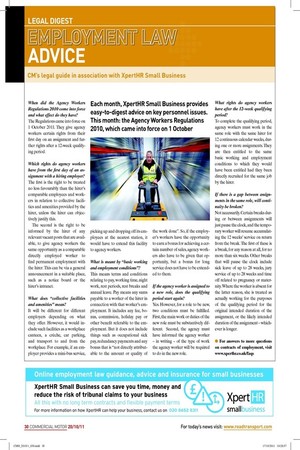Each month, XpertHR Small Business provides easy-to-digest advice on key
Page 21

If you've noticed an error in this article please click here to report it so we can fix it.
personnel issues. This month: the Agency Workers Regulations 2010, which came into force on 1 October
When did the Agency Workers Regulations 2010 come into force and what effect do they have?
The Regulations came into force on 1 October 2011. They give agency workers certain rights from their irst day on an assignment and further rights after a 12-week qualifying period.
Which rights do agency workers have from the irst day of an assignment with a hiring employer? The irst is the right to be treated no less favourably than the hirer’s comparable employees and workers in relation to collective facilities and amenities provided by the hirer, unless the hirer can objectively justify this.
The second is the right to be informed by the hirer of any relevant vacant posts that are available, to give agency workers the same opportunity as a comparable directly employed worker to ind permanent employment with the hirer. This can be via a general announcement in a suitable place, such as a notice board or the hirer’s intranet.
What does “collective facilities and amenities” mean?
It will be different for different employers depending on what they offer. However, it would include such facilities as a workplace canteen, a crèche, car parking, and transport to and from the workplace. For example, if an employer provides a mini-bus service, picking up and dropping off its employees at the nearest station, it would have to extend this facility to agency workers.
What is meant by “basic working and employment conditions”? This means terms and conditions relating to pay, working time, night work, rest periods, rest breaks and annual leave. Pay means any sums payable to a worker of the hirer in connection with that worker’s employment. It includes any fee, bonus, commission, holiday pay or other beneit referable to the employment. But it does not include things such as occupational sick pay, redundancy payments and any bonus that is “not directly attributable to the amount or quality of the work done”. So, if the employer’s workers have the opportunity to earn a bonus for achieving a certain number of sales, agency workers also have to be given that opportunity, but a bonus for long service does not have to be extended to them.
If the agency worker is assigned to a new role, does the qualifying period start again?
Yes. However, for a role to be new, two conditions must be fulilled. First, the main work or duties of the new role must be substantively different. Second, the agency must have informed the agency worker – in writing – of the type of work the agency worker will be required to do in the new role. What rights do agency workers have after the 12-week qualifying period?
To complete the qualifying period, agency workers must work in the same role with the same hirer for 12 continuous calendar weeks, during one or more assignments. They are then entitled to the same basic working and employment conditions to which they would have been entitled had they been directly recruited for the same job by the hirer.
If there is a gap between assignments in the same role, will continuity be broken?
Not necessarily. Certain breaks during or between assignments will just pause the clock, and the temporary worker will resume accumulating the 12 weeks’ service on return from the break. The irst of these is a break, for any reason at all, for no more than six weeks. Other breaks that will pause the clock include sick leave of up to 28 weeks, jury service of up to 28 weeks and time off related to pregnancy or maternity. Where the worker is absent for the latter reason, she is treated as actually working for the purposes of the qualifying period for the original intended duration of the assignment, or the likely intended duration of the assignment – whichever is longer.
• For answers to more questions on contracts of employment, visit www.xperthr.co.uk/faqs










































